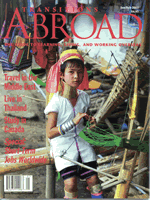
|
|
|
||||
| ► Browse Magazine Back Issues |
Transitions Abroad Magazine January/February 2003 Vol. XXVI, NO. 4 |
||
 |
 |
|
|
Alternative Travel Guides Feature Back Door Travel Living Abroad Working Traveler Jobs Abroad Alternative Travel 2003 Directory of Programs Education Abroad Program News & Notes Classifieds Transitions Abroad |
From the Publisher We prepare to go to press just after the 39th anniversary of JFK's assassination, an event that many of us felt to be a turning point in our lives and in retrospect see as a turning point in America's relationship with the rest of the world. We (my wife Joanna and 3-year-old son Greg, who happened to have been born on the same day as John Kennedy, Jr.) got the news onboard a ship from Europe to North Africa. We were at the start of a yearlong voyage across North Africa and much of the Arab world. At that time America was widely admired and its president loved — which partly explained the warm reception our family enjoyed from Morocco to India. In contrast, today's front-page story in the New York Times on the murder of an American in Sidon, Lebanon says the authorities are "looking at the case in the context of the anti-Americanism that is raging across Lebanon and much of the Middle East." (See my photo of Lebanon’s port of Sidon 39 years ago, page 12.) This issue begins with an argument by Rob Sangster that now is the time to visit Muslim countries and ends with Erika O'Neill's reflection on how she fell in love with Egypt as a student and why she now thinks of the Middle East in terms of the safety of her family and the threat of another terrorist attack. To reverse the growing tide of hatred in the Arab world and our own growing fear will require much more than a military response to religious fanatics and evil dictators. It will require the awareness and understanding that comes only through sustained and meaningful people-to-people contact, through educational travel. One of the few bits of good news to come out of the 9/11 horror is the increase in the number of American students going abroad. The Institute of International Education (IIE) surveyed 324 educators on college campuses at the start of the fall 2002 term to see how many of their students were studying abroad this year compared to last. Fully 45 percent of respondents reported an increase. This comes against the background of an increase of 116 percent (71,154 to 154,168) from 1991/92 to the present. (For a summary of the major findings of IIE's Open Doors 2002, go to opendoors.iienetwork.org.) The fact that students' responses to terrorism is to seek first-hand interaction with other cultures — and the increased cultural competency and respect for cultural differences that should result — is good news indeed. — Clay Hubbs
|
|
|
|
| About Us | |
| Contact Us | |